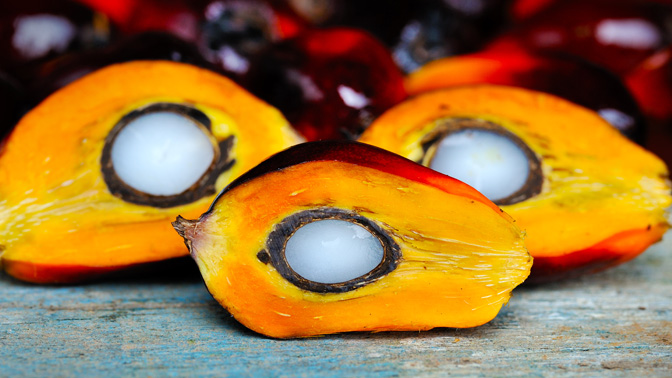Home page Description:
New study reveals how the saturated fat palmitic acid helps the immune system fight infections.
Posted On: January 09, 2020

Image Caption:
Palmitic acid is a major constituent of palm oil, one of the most widely consumed vegetable oils. Palm oil is made from the pulp of the oil palm fruit (pictured above).
Saturated fats have a bad reputation. Eating a diet rich in saturated fats can cause unhealthy weight gain and increase a person’s risk of heart disease, stroke and other health problems.
A new study from the University Health Network (UHN) reminds us that some saturated fats can promote health when consumed in the recommended quantities.
Dr. Brian Raught, a Senior Scientist at the Princes Margaret Cancer Centre (UHN), and his colleagues discovered that the saturated fat palmitic acid plays an important role in mounting an effective immune response. Their findings were recently published in the prestigious journal Science.
Palmitic acid is the most common type of saturated fat in the human body. It is naturally produced by the body and can also be obtained by eating meat, dairy products and vegetable oils.
The researchers discovered that palmitic acid helps a protein, known as the NOD-like receptor (NLR), perform its function. The NLR protein is found in immune cells and acts like an alarm to signal the immune system to mount an attack against invading bacteria.
“A derivative of palmitic acid must be attached to the NLR protein for the protein to be properly located within an immune cell to trigger an immune response,” says Dr. Raught.
The researchers also presented evidence suggesting that when the derivative is not attached to the NLR because of genetic changes, it could lead or contribute to Crohn’s disease, an immunologic disorder that affects the gastrointestinal tract.
Commenting on the study, Dr. Raught says “We anticipate that our findings will advance the understanding and ultimately the treatment of NLR-driven diseases, including NLR-dependent immunological diseases and chronic bacterial infections.”
This work was supported by the Natural Science Foundation of China, the Zheijiang Provincial Natural Science Foundation of China, the Ministry of Science and Technology of the People’s Republic of China, the Canadian Institutes of Health Research, the J.P. Bickell Foundation and the Leona M and Harry B Helmsley Charitable Trust. SE Girardin is a Tier 2 Canada Research Chair in Innate Immunity and Microbial Pathogenesis.
Lu Y, Zheng Y, Coyaud É, Zhang C, Selvabaskaran A, Yu Y, Xu Z, Weng X, Chen JS, Meng Y, Warner N, Cheng X, Liu Y, Yao B, Hu H, Xia Z, Muise AM, Klip A, Brumell JH, Girardin SE, Ying S, Fairn GD, Raught B, Sun Q, Neculai D. Palmitoylation of NOD1 and NOD2 is required for bacterial sensing. Science. 2019 Oct 25. doi: 10.1126/science.aau6391.




